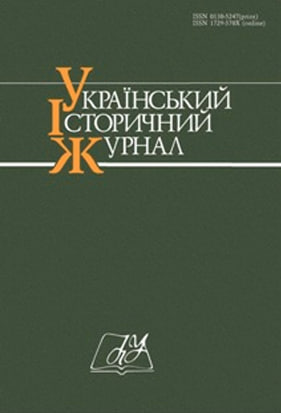Jews in Volyn in the Sixteenth and the First Half of the Seventeenth Centuries: Between the Norm of the Law and the Practice of Life
DOI:
https://doi.org/10.15407/uhj2023.05.119%20Keywords:
Jews, Volyn, towns, nobility, clergy, justice systemAbstract
The purpose is to analyze the legal and actual situation of Jews in Volyn in the early modern period and to find out their place in the region society of that time.
The methodology is based on the principles of historicism, systematicity, scientificity, and comprehensiveness. Historical-comparative, problem-chronological, and retrospective methods were also used in the work.
The scientific novelty lies in the comprehensive study of the source base (both published and scripted) and the historiography of the problem, which made it possible to present a spectrum of Jewish life in Volyn more broadly.
Conclusions. A thorough study of the sources made it possible to prove the exceptional role of Jews in the life of Volyn at the specified time. The Jews used the privileges granted to them by the kings / grand dukes and the owners of the cities in which they lived. Royal privileges were often granted to boThentire urban communities and individual Jews. The norms of Lithuanian Statutes and Seim constitutions influenced the life of Jews. Jews used the right to move freely from one settlement to another. In the royal cities, agreements were often concluded between the townspeople and Jews regarding their occupations in crafts and trade, and Jews also tried to participate in the tax and financial life of the city. There are known cases of Jews conversions to Christianity. Jewish communities were subordinated to governors and elders and, in private cities, to the owners of these settlements, who took care of the Jewish justice system. There was also a Jewish court for petty cases. Despite the “infidelity”, the jurat of the Jews was recognized in court. Sources prove that it was quite possible for Jews to find justice in city and town courts. There are well-known cases of banishment of burghers and nobility as a result of lawsuits by Jews against them. Litigations between Jews, in the case of the impossibility of solving them in the Jewish court were considered in the city court. As we know from sources, Jews were also in the service of the nobility. Christians (burghers and peasants) were hired by Jews. There was tension in the relations between the clergy (Catholic and Orthodox) and the Jews. The sources confirm the presence of certain restrictions on Jews, but do not provide grounds to claim that the Jewish population of Volyn was deliberately persecuted or humiliated during this period.


